18 Movies I'm Sorry To Say Are Better Than The Book
What exactly makes a great movie adaptation? If you ask me, it's all in the creative liberties. Adaptations aren't meant to be strict recreations of their source material, and often, they're better for not being that at all (e.g. Stanley Kubrick's The Shining...sorry in advance to Stephen King fans, count me among them!). A film adaptation should capture and celebrate the unique "essence" of the original story through reinterpretation of characters, plot, setting, themes, and motifs. While it is entirely possible to enjoy both the book and movie with equal passion, for the purposes of this list, I've decided to round up a handful of adaptations I personally believe have a slight edge over the wonderful books they're based on.
1.Requiem for a Dream (2000)
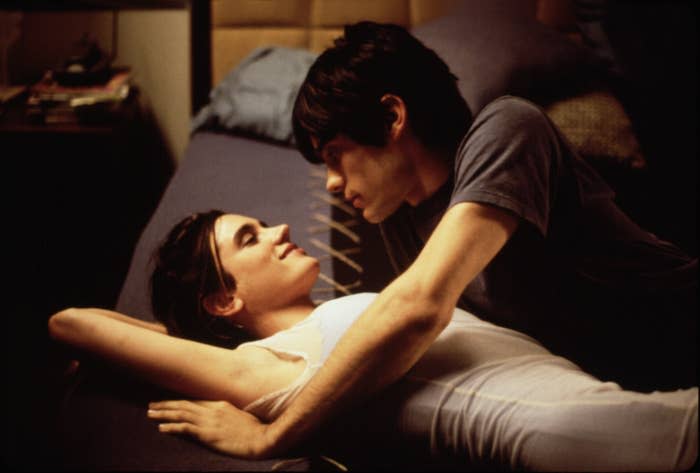
Based on: Requiem for a Dream by Hubert Selby Jr. (1978)
Why the movie is better: At 15 years old, I was down in my parent's basement as the credits rolled on my Blockbuster DVD copy of Requiem for a Dream. I was, for lack of a better term, shell-shocked, and terrified to climb back upstairs alone. Every silence in the house felt punctuated by terror as images from the film flashed on a loop through my mind, all accompanied, of course, by Clint Mansell's crashing score. Darren Aronofsky's nightmarish portrayal of drug addiction features an all-star cast — Ellen Burstyn, Jared Leto, Jennifer Connelly, and Marlon Wayans — but it's never the actors here that you focus on. Rather, it's the intensity of their characters' journeys into spirals of addiction, where there are no happy endings, just bleak train rides into hell. Hubert Selby Jr. published the groundbreaking original novel in 1978, and while it is undeniably a fantastic piece of fiction, Aronofsky's adaptation takes the source material to dazzling new heights. Through stylish jump cuts, split-screens, and tightly edited montages, he's created a work with meticulous sound design that blends hip-hop, classical, and electronic musical stylings along with surreal diegetic and non-diegetic sounds. All of this makes for a startling, heart-pumping viewing experience that perfectly mirrors the extreme highs and lows of our tragic anti-heroes Harry, Marion, Sara and Tyrone. To this day, I can still hear the haunting, devastatingly optimistic wail of Bursyn's pill-addicted Sara Goldfarb as she cries: "I'm going to be on television!"
Where to watch: Prime Video
2.A Simple Favor (2018)

Based on: A Simple Favor by Darcey Bell (2017)
Why the movie is better: Blake Lively will probably forever be remembered as Serena van der Woodsen to me, the troubled rich teen from Gossip Girl whose character arc quickly became flat over the course of the early '00's teen show's run. Here, however, Lively really shines as terrifyingly "beautiful ghost" Emily Nelson, and more than proves she's got the acting chops to back up her star power. The film is based on the 2017 debut thriller by Darcey Bell, which follows small town Connecticut mom blogger Stephanie (Anna Kendrick) as she seeks to uncover the truth behind her best friend Emily's disappearance. While it is excellently paced and plotted, director Paul Feig's adaptation really ups the pulse-pounding stakes. For one, many of the book's slightly extraneous details (of which I won't spoil) are cut in favor of a simpler, more streamlined story. Stephanie is also a lot more likable and relatable in the film, helped a great deal by Kendrick's charming performance, whereas screen Emily is even scarier than her book counterpart, and feels just as elusive, exciting, and dangerous in the movie as everyone describes her to be. Stephanie is also a vlogger here — not a blogger as she in the book — a tiny change in detail which works really well in a visual medium.
Where to watch: Prime Video
3.Fight Club (1999)

Based on: Fight Club by Chuck Palahniuk (1996)
Why the movie is better: Listen, I'm a huge fan of Chuck Palahniuk, and his satirical novel (first written as a short story) about a man struggling to make sense of life in the modern world is undeniably excellent. You can tell that he really poured all of his pent-up frustration at the publishing industry, consumerism, and contemporary America right into it. Yet, there just is no comparison to the film, which remains a modern favorite for "movie nerds" of all types (not just "film bros," thank you very much). Brad Pitt and Edward Norton are one of the most dynamic, entertaining duos ever seen together on-screen, and the frenetic, anxious energy of the book is captured so perfectly by David Fincher's masterful directing. Overall, it's a loyal adaptation of a novel with a punchy, attention-grabbing narrative voice, something quite hard to translate into film. The twist, similarly, is not a simple feat to pull off on-screen, but Fincher — riding the recent success of his previous hit Se7en — was eager to prove himself in a work just as edgy and hard-hitting as Palahniuk's writing, and he sure did that in spades. Palahniuk even praised him for making story connections that he himself didn't originally see. While the cult classic failed to recoup most of its production budget at the domestic box office, it's gone on to gross $100 million worldwide...and we all still know the first rule of Fight Club.
Where to watch: Prime Video
4.Can You Ever Forgive Me? (2018)
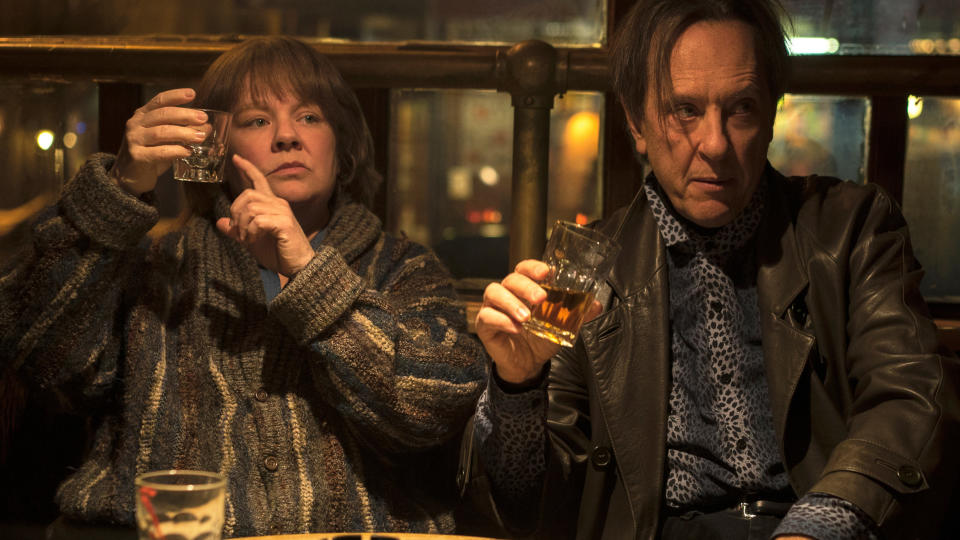
Based on: Can You Ever Forgive Me?: Memoirs of a Literary Forger by Lee Israel (2008)
Why the movie is better: I saw Can You Ever Forgive Me? back in theaters in 2018, and I still remember the emotional gut punch it gave me right at the end. I also recall feeling like this was one of the few Hollywood movies that accurately described the complicated, specific woes of being a professional author. Melissa McCarthy stars as Lee Israel — a failing writer who finds new success in forging letters from deceased authors and playwrights — in this biopic based on Israel's own memoir, Can You Ever Forgive Me?: Memoirs of a Literary Forger, released 10 years prior to the film. While the memoir is no doubt fascinating on its own, director Marielle Heller and screenwriters Nicole Holofcener and Jeff Whitty breathe new life into this darkly witty tale that features, quite frankly, some of McCarthy and co-star Richard E. Grant's best on-screen work. McCarthy turns a downtrodden, otherwise deeply unlikable heroine into someone outright lovable and forgivable, and Grant provides a poignant charm as her brilliant, witty best friend who is tragically dying of AIDS. To note, both characters and the people they are based on were gay, and it's doubly rare we get to witness such a delightful platonic relationship between two queer people in a big budget film.
Where to watch: Prime Video
5.Blade Runner (1982)
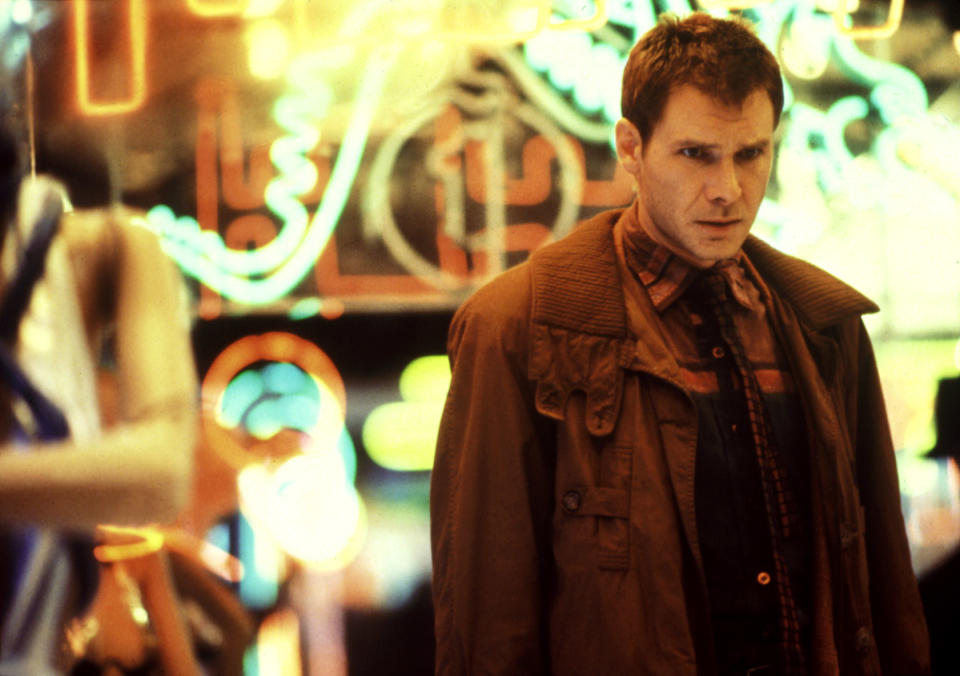
Based on: Do Androids Dream of Electric Sheep? by Philip K. Dick (1968)
Why the movie is better: Ridley Scott's atmospheric cyberpunk masterpiece is widely regarded as one of the most influential works of the entire sci-fi genre, but some fans may be surprised to know that it was based on Philip K. Dick's 1968 novel, Do Androids Dream of Electric Sheep?. I read the book in college before our class viewed the film, and while I found it highly original and disturbing in all the best ways, it was no match for Scott's cinematic vision. The dystopian novel is set in post-apocalyptic San Francisco, in which most animals species are either endangered or extinct. Bounty hunter Rick Deckard is tasked with "retiring" (i.e. murdering) six escaped androids, while another man works to aid android fugitives. The book was no doubt key in a whole new generation of sci-fi stories, but the film version really brings the source material to life in the style of a classic neo-noir detective movie. There are countless changes in the film's script as well, most notably the additions of the terms "blade runner" and "replicant," and film Deckard (played by legendary Harrison Ford) is a brooding bachelor who, unlike his novel counterpart, is a second-rate killer and frequently mocked by his colleagues. He's also, in my opinion, far more of a sympathetic protagonist — especially in his romantic pursuit of replicant Rachael (Sean Young) — and the ending of the movie has a touching, hopeful feel that stands in stark contrast to the the much bleaker finale of the novel.
Where to watch: Netflix
6.Annihilation (2018)
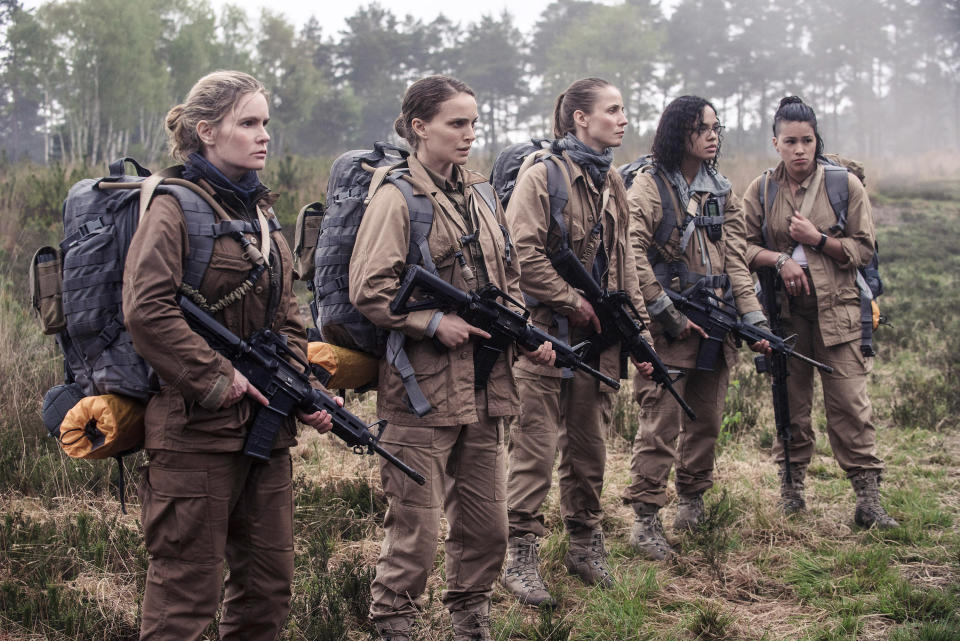
Based on: Annihilation by Jeff VanderMeer (2014)
Why the movie is better: There aren't many films that have given me such a specific feeling of existential dread as Annihilation did. The 2018 movie, based on Jeff VanderMeer's 2014 science-fiction horror novel of the same name, follows Lena (played by Natalie Portman), a biologist and former soldier who joins a mission to enter the mysterious zone Area X in an attempt to find out what happened to her husband. He's been missing for a year, and her grief colors every frame of the screen, often manifesting in dizzying, surrealist nature sequences that are as haunting as they are hypnotic. While VanderMeer's book is the first in an epic science fiction trilogy and deserves all the awards and recognition it's achieved, there is something about this portrayal of grief that works so much better in a visual medium. The film's ending feels hauntingly, inevitably complete. Also, there's nothing quite like sitting in a dark theater, witnessing the truly terrifying "bear monster" sniff its potential victims and open its mouth wide for a bite into one of their faces. This movie is honestly a profoundly personal viewing experience, so go see it for yourself. Tessa Thompson, Oscar Isaac, Jennifer Jason Leigh and Gina Rodriguez also star.
Where to watch: Paramount+
7.The Silence of the Lambs (1991)

Based on: The Silence of the Lambs by Thomas Harris (1988)
Why the movie is better: Hannibal Lecter is terrifying, just terrifying, both in the Thomas Harris' book series (beginning with 1981's Red Dragon, the prequel to The Silence of the Lambs) and especially when played by the absolutely brilliant Anthony Hopkins in the 1991 film adaptation. Once you've seen the scene in which he faces down — and completely dresses down — FBI Agent Clarice Starling (played by Jodie Foster in her Oscar-winning role) with the flick of his tongue, it's impossible to imagine anyone else playing the ingenious psychopath who can read anyone like a book. So, too, is the jaw-dropping Buffalo Bill dance sequence impossible to bleach out of your brain. Not that you'd want to; it's so freaking good. The main difference between the book and film lies in the ending. In the book (*spoilers ahead*), Hannibal doesn't say goodbye to Clarice by payphone while escaped to the tropics, but by letter, and screenwriter Ted Tally thought (rightfully) that this lacked the cinematic pizzaz needed for the big screen. The original movie ending was meant to be even darker: Tally had planned to show Lecter slicing oranges before preparing to dismember a terrified victim with the same knife, which was scrapped at the request of directorJonathan Demme for being "too horrifying." Nonetheless, the movie version of The Silence of the Lambs remains bone-chilling to its core, the acting is superb throughout, and while each are superlative in their own right, the movie has gone on to inspire a whole new era of excellent cannibal serial killer entertainment, from the Hannibal television show to the CBS reboot Clarice, along with all of the awesome psychological thriller content that's come since.
Where to watch: Prime Video
8.City of God (2002)
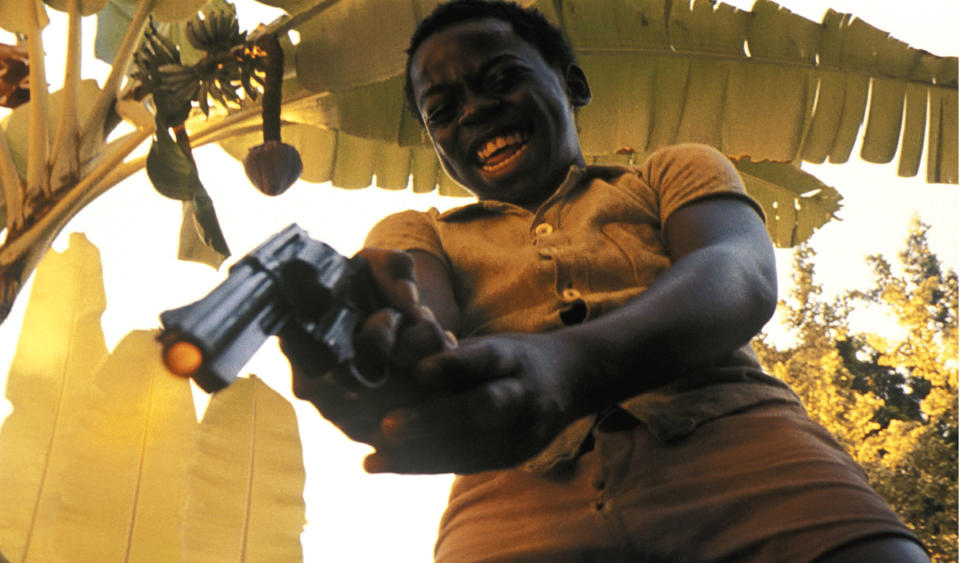
Based on: City of God by Paulo Lin (1997)
Why the movie is better: Paulo Lins' 1997 novel City of God was a critically acclaimed international hit, a gorgeous, grisly tour through the Brazilian streets of Cicade de Deus, the City of God, and the gang life in Rio de Janeiro's favelas. The book is based on years of meticulous research and Lins' own firsthand experiences growing up in Cicade de Deus, and is an outstanding achievement. Co-directors Fernando Meirelles and Kátia Lund's cinematic adaptation, however, leans far more into the gritty environment of the '60's-'80's-era poverty-stricken favelas, and while the stories of ambitious drug dealers (split into three distinct segments) are essential to the viewing, they almost become secondary to the powerful performances, sweeping cinematography, and beautiful, blood-stained surroundings. Screenwriter Bráulio Mantovani also takes great care to pay homage to the people of Rio, celebrating their culture and people even amid such harrowing circumstances. Often compared to the likes of Goodfellas and even the earlier works of Quentin Tarantino (though arguably less violent than Scorsese's very similar Gangs of New York), City of God is widely considered to be one of the best films of the 21st century; even within miserable darkness there is great beauty.
Where to watch: HBO Max
9.Psycho (1960)
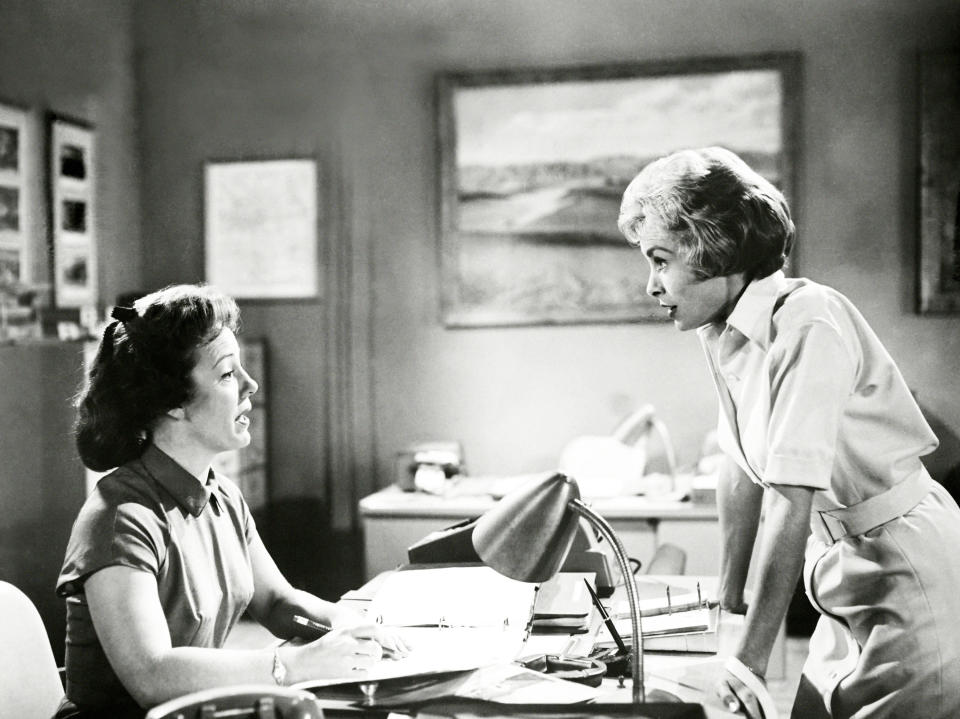
Based on: Psycho by Robert Bloch (1959)
Why the movie is better: Alfred Hitchcock’s masterpiece that made millions terrified to take a shower is actually far from original: It was based on Robert Bloch’s 1959 novel of the same name, in which, fascinatingly, the shower scene in which Marion Crane (Janet Leigh) is brutally murdered was described in only one line of text. Using a dizzying array of fast-motion reverse shots, extreme close-ups, and grisly stabbing sound effects, Hitchcock brings the horror to life. The suspense throughout the movie is built so well, the plot is so tight, and the acting from Leigh and Anthony Perkins (who plays Norman Bates) is so darn good, the 1960 flick still holds up as one of the scariest and most effective of all time. Not to mention, Hitchcock really put the work into humanizing his main villain Bates and fleshing out Marion's character, making it all the more impactful when she meets her devastating end before the plot even fully takes off.
Where to watch: Prime Video
10.Mean Girls (2004)
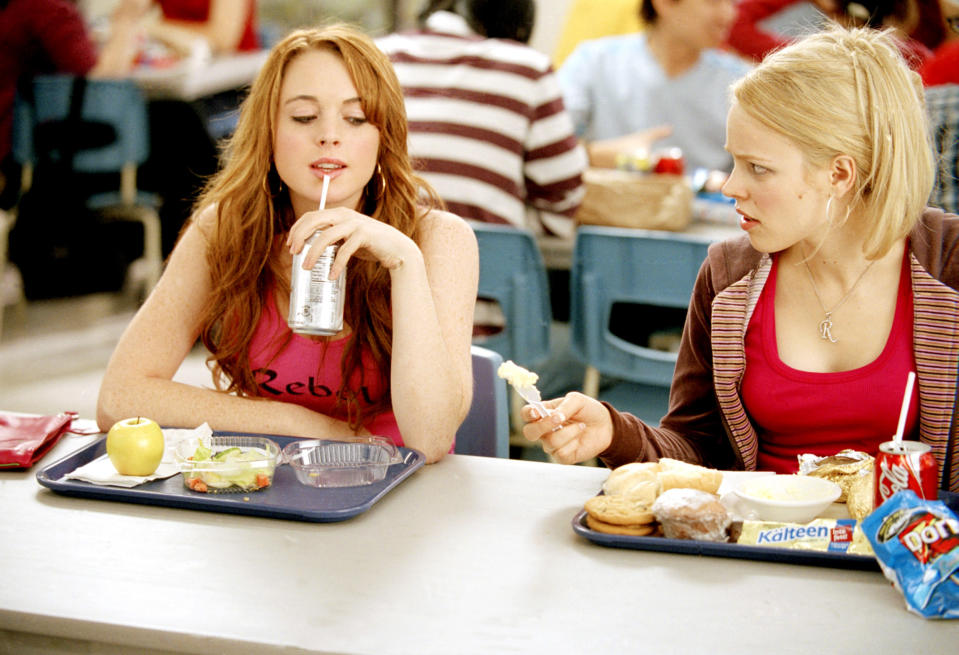
Based on: Queen Bees and Wannabes: Helping Your Daughter Survive Cliques, Gossip, Boyfriends, and the New Realities of Girl World by Rosalind Wiseman (2002)
Why the movie is better: The iconic, highly quotable teen movie that helped remind the world of Lindsay Lohan's undeniable prowess as a comedic actor is actually loosely based on a non-fiction self-help/parenting book from 2002. I remember going to see a similar author who specialized in teen girl aggression, with Wiseman being a guest speaker at the time. During the talk, she plugged Queen Bees and Wannabes, which I found to be pretty insightful, though the film is far more entertaining and memorable. Aided by the sharp writing of SNL's fabulous Tina Fey (who optioned the book), the film is actually co-written by Fey and Wiseman herself. Much of the terminology from the movie is lifted directly from the self-help text, from the definition of what exactly makes a "Queen Bee" girl clique leader to an elaborate definition of "Girl World." The book, of course, has a more somber tone than the film. And, though helpful and thoughtful, it's way less engaging and memorable than the punchy, witty, endlessly meme-able high school comedy-drama that it inspired. Not to mention, the salacious Broadway musical spin-off which, despite its campy tone, resonates with teens then and now for its stark portrayal of girl-on-girl bullying and the pressures of contemporary high school life. It's not like a regular movie, it's like a cool movie.
Where to watch: Paramount+
11.The Shining (1980)
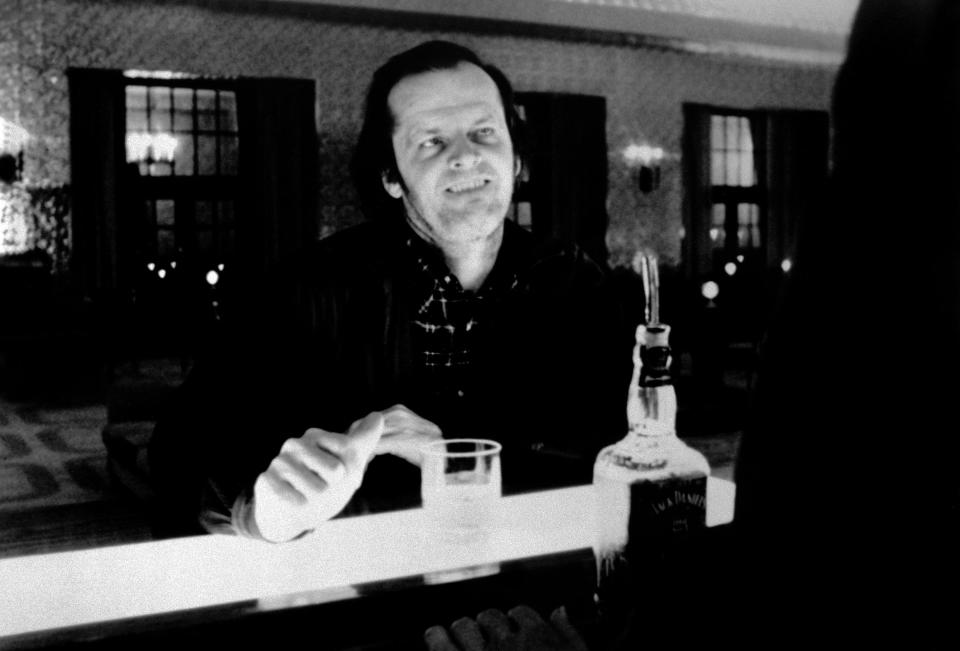
Based on: The Shining by Stephen King (1977)
Why the movie is better: While I'm well aware that this selection may anger a number of Stephen King fans, I stand by this choice for a number of reasons. For one, Stanley Kubrick takes the source material and turns it into something that King never envisioned...which is part of why the author loathes the film so much. However, Kubrick's adapted vision is multi-layered in its ambiguity, is genuinely horrifying, and is far darker than the original novel. In fact, I've seen The Shining many times, reading new layers and finding new theories on every viewing, where it took a while to finish King's novel. As much as I enjoy him as a storyteller and tip my hat to him being one of the greatest and most influential horror writers of all time, I've always been more intrigued by the Jack Torrance of Kubrick's version, played here by the always enigmatic and fascinating Jack Nicholson. Unlike Book Jack, Movie Jack isn't an inherently good man trying to do his best as a husband father; he's an absolute nightmare, a ticking time bomb waiting to explode, and the Overlook Hotel is less of a supernatural terror and more of disturbing psychological journey of one man slowly losing his mind in isolation with his family. Oh, and if you love overanalyzing every inch of this movie as much as I do, check out Rob Ager's painstakingly researched video analyses on various Shining theories. The 2012 documentary Room 237 covers a lot of similar ground on the dozens of interpretations, but Ager (who actually turned down a spot in the doc) goes way further in depth and even debunks a few of them. Basically, in addition to being scary as hell, this movie is an endless rabbit hole.
Where to watch: HBO Max
12.The Hunger Games: Catching Fire (2013)
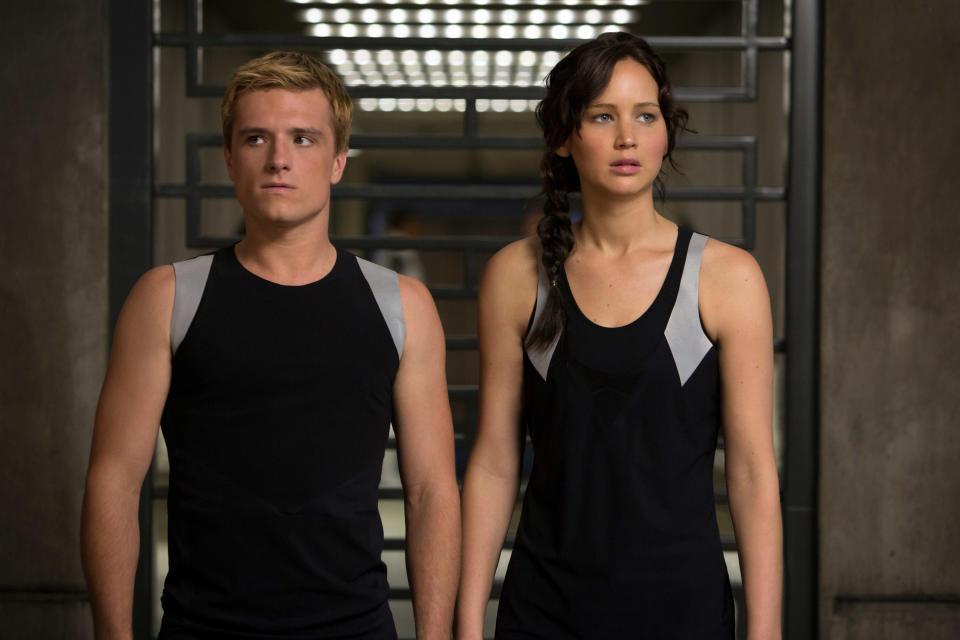
Based on: The Hunger Games by Suzanne Collins (2008)
Why the movie is better: I enjoyed the original young adult novels by Suzanne Collins and I did quite like the first The Hunger Games film, but it wasn't until Catching Fire that I really got hooked on the series (and it wasn't the book version that did it for me). Filled with subtle racial and class commentary, as well as smart reality TV satire, Catching Fire the film is no doubt derived from strong source material, but adds new contextual layers to the story that turns it from a run-of-the-mill YA adaptation into something far more special and interesting. Not only did it make a killing at the box office and rightfully help cement Jennifer Lawrence as the next Hollywood It Girl, the violent, unforgiving futuristic world of the books is so much more chilling and compelling in a big budget film, especially the high-intensity gore and terror during the Games themselves, and the essential diversity of Collins' characters becomes impossible to deny when the on-screen actors are actually people of color.
Where to watch: Hulu
13.The Godfather (1972)
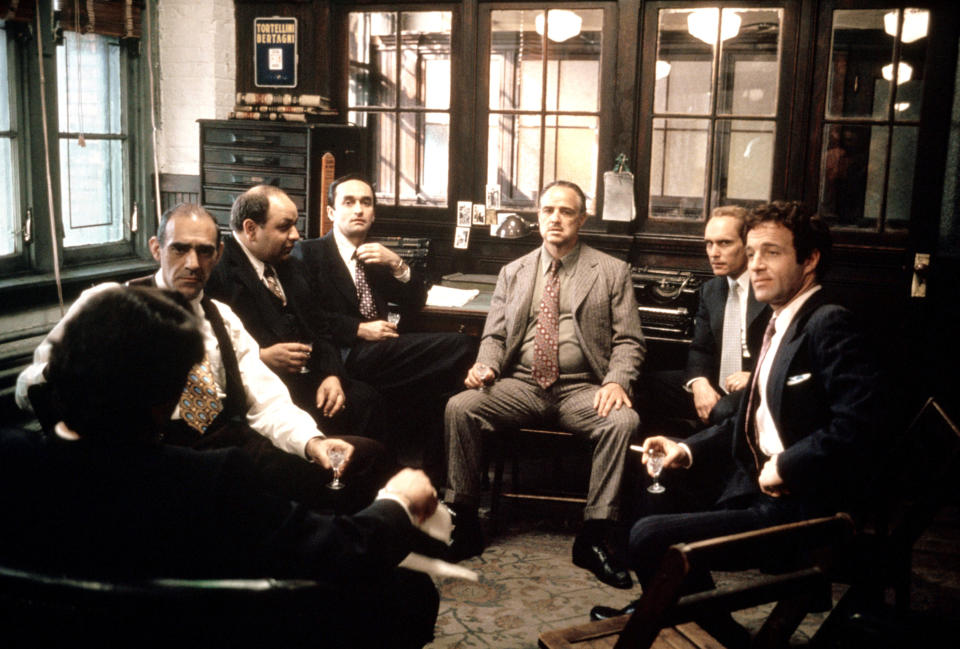
Based on: The Godfather by Mario Puzo (1969)
Why the movie is better: Mario Puzo’s infamous 1969 crime novel topped the New York Times Bestseller list for over a year — an accomplishment that is certainly nothing to sniff at — but it was arguably Francis Ford Coppola who turned The Godfather into perhaps the most important cinematic achievement in modern history. Coppola simplified the novel's story, trimmed its many subplots, and focused more firmly on the mirrored relationship between the aging Don Vito Corleone (Marlon Brando) and his successor Michael Corleone, played by Al Pacino in his most acclaimed role of all time. Throughout the film, war hero Michael is slowly but surely corrupted and becomes more and more like his father, making him both a tragic anti-hero and a supremely disturbing yet believable villain. The ending sequences remain as epic as they are haunting, and have gone on to inspire similarly brilliant scenes in shows like Breaking Bad and excellent crime films like Park Hoon-jung's New World.
Where to watch: Prime Video
14.Jurassic Park (1993)
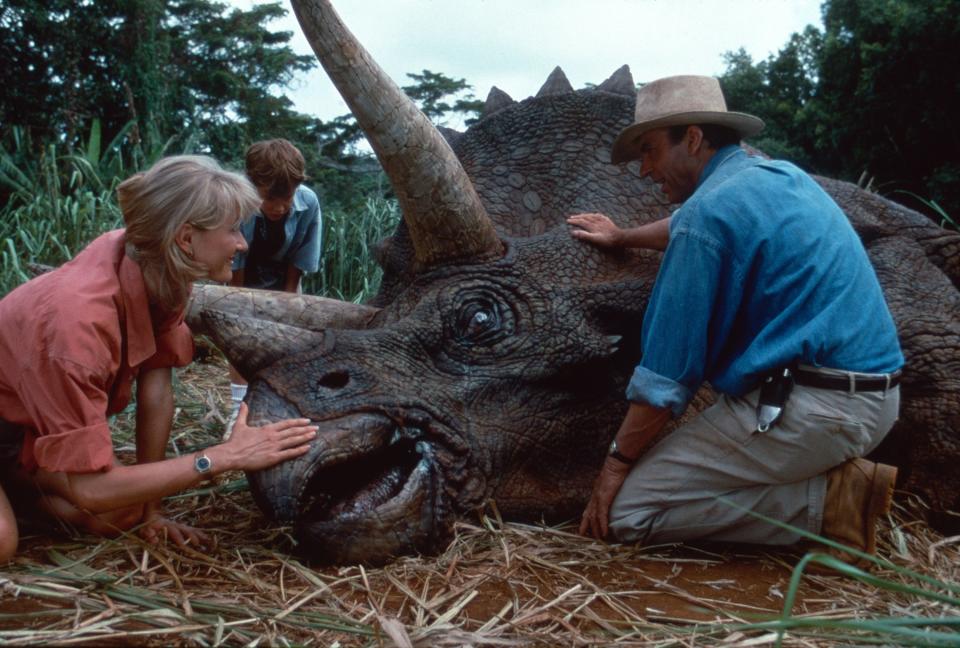
Based on: Jurassic Park by Michael Crichton (1990)
Why the movie is better: There is no doubt about it: Michael Crichton is a fantastic thriller writer, but when you get Steven Spielberg involved in an already awesome project about freaking dinosaurs in the modern age, things quickly go from really good to great. The book is exciting and well-paced, but the blockbuster is what I immediately think of when I hear the term "movie magic." While the film is quite tame in comparison to the book (likely toned down to achieve a more universal PG-13 rating), Spielberg and his team really brought the prehistoric creatures to life in the most mesmerizing way. Like the book, it's a cautionary tale about unchecked scientific ambition and meddling around too much with Mother Nature, especially for commodification purposes. Crichton used his MD from Harvard Medical School and ultra-impressive knowledge of biology to build a world like no other, and both the book and movie have a chilling tone. However, there's really nothing like seeing a majestic Brachiosaurus or a pack of vicious Velociraptors come to life on the big screen. Easy-going Dr. Alan Grant is played superbly here by Sam Neill, and Laura Dern completely shines as Dr. Ellie Sattler in a role originally offered to French actress Juliette Binoche.
Where to watch: HBO Max
15.Jaws (1975)
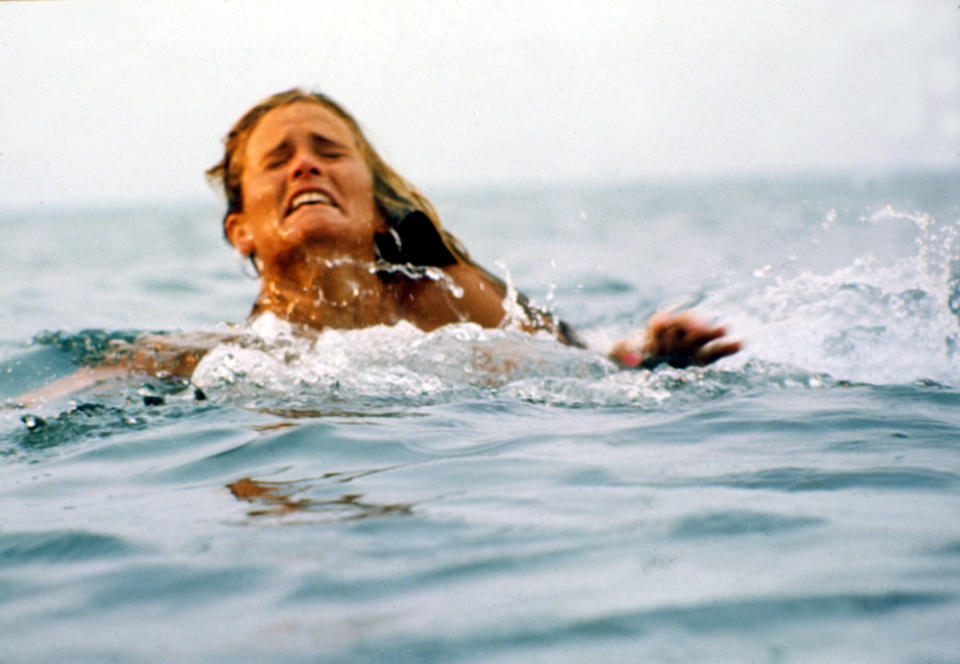
Based on: Jaws by Peter Benchley (1974)
Why the movie is better: Much like with Jurassic Park, Spielberg works his movie magic into elevating an already excellent literary text, or in this case, a 1974 novel by Peter Benchley about a giant great white shark that preys upon a small resort town and the journey of three men who attempt to kill it. Unlike in the novel, Spielberg chooses to cut meandering subplots like an affair between Chief Martin Brody's wife and a marine biologist. Instead, using the film's two-hour run time to ramp up the ever-increasing stakes and tension, all set to John Williams’ Academy Award-winning score. Originally, the flick was going to be a cheesy B-movie made with animatronic sharks (which were major mechanical nightmares on set), but combined with Spielberg's visionary writing and directing, Robert Shaw's elevated performance as Quint, and an extremely fun new storyline, Jaws stands the test of time as one of the most influential and exciting movies ever made.
Where to watch: Prime Video
16.The Shawshank Redemption (1994)

Based on: Rita Hayworth and Shawshank Redemption (Different Seasons) by Stephen King (1982)
Why the movie is better: Stephen King fans, please don't hate me, but this is yet *another* adaptation of his writing that just works so much better as a movie (though I'd say here, most critics would agree). The film is based on the 1982 novella Rita Hayworth and Shawshank Redemption, which is from King's dramatic collection Different Seasons, though it's also been published as a standalone book. The entire novella is narrated by a man named Red — played stunningly well by Morgan Freeman in the 1994 film adaptation — and tells the story of Andy Dufresne, an imprisoned man who claims to have been wrongly convicted and makes it his mission to escape from prison. As the story of the film is longer than the novella, it expands upon it a great deal and adds some pretty killer payoff: a fantastic ending that I won't spoil, and a strong, fully fleshed-out friendship between Red and Andy (played by Tim Robbins) with enough genuinely touching moments to make even the most stone-cold viewers a little teary-eyed. Despite its critical acclaim, the film — directed and written by Frank Darabont — wasn't a huge success at the box office during its initial run, in part due to competition like Pulp Fiction and Forrest Gump. However, it did garner multiple award nominations, took home seven Academy Awards, and snagged a theatrical re-release that turned its box-office gross from $16 million to $73.3 million. In 2015, the Library of Congress even selected the film for preservation at the National Film Registry for its culture, historical, and aesthetic significance.
Where to watch: HBO Max
17.No Country for Old Men (2007)
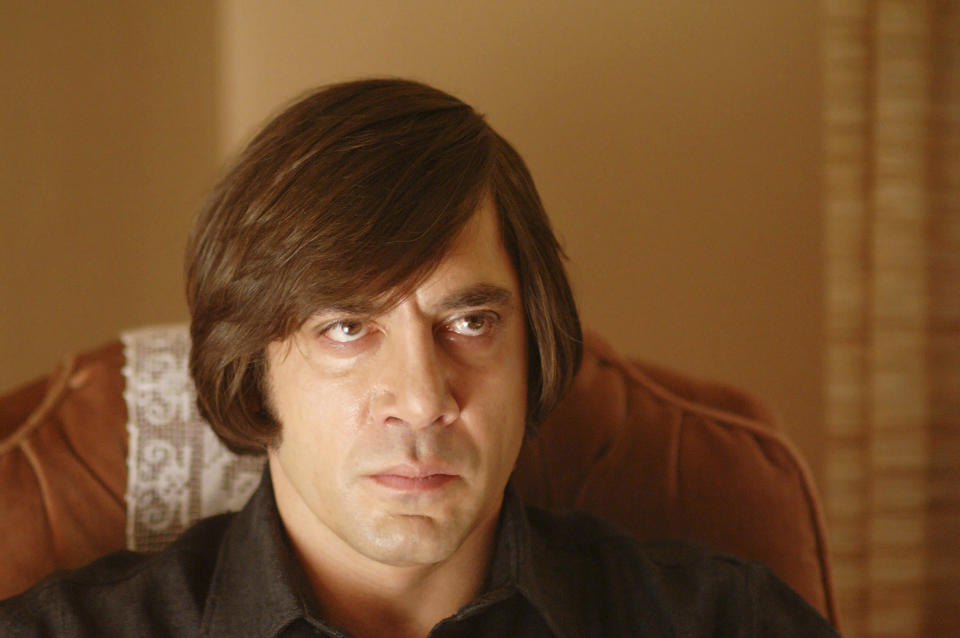
Based on: No Country For Old Men by Cormac McCarthy (2005)
Why the movie is better: This grisly psychological thriller by the Coen brothers is probably the best film they've ever made, and that's saying a lot, since these same men brought us the likes of Fargo and Inside Llewyn Davis. Cormac McCarthy penned the original novel and, remarkably, very little was changed for the book's adaptation, including its foreboding tone, surprising twists and turns, and array of well-developed characters. However, unlike in the book where Sheriff Ed Tom Bell narrates all of the events as he investigates a rural Texas drug deal gone awry, the movie (in which he's expertly portrayed by Tommy Lee Jones) makes use of his monologues via voiceover in between scenes, but it is a technique used sparsely. We also get the magnum opus of Javier Bardem, a stand-out as chillingly sociopathic hitman Anton Chigurh. The resulting adaptation feels just as literary as the novel, but the lack of constant narration makes for a far more natural viewing experience, as the Coens allow viewers to truly immerse themselves in its cynical, nihilistic world. It's no wonder that the film swept at the 2008 Academy Awards, taking home Best Picture, Best Directing, and Best Writing (Adapted Screenplay), with Bardem receiving Best Supporting Actor, as he well should've.
Where to watch: HBO Max
18.2001: A Space Odyssey (1968)
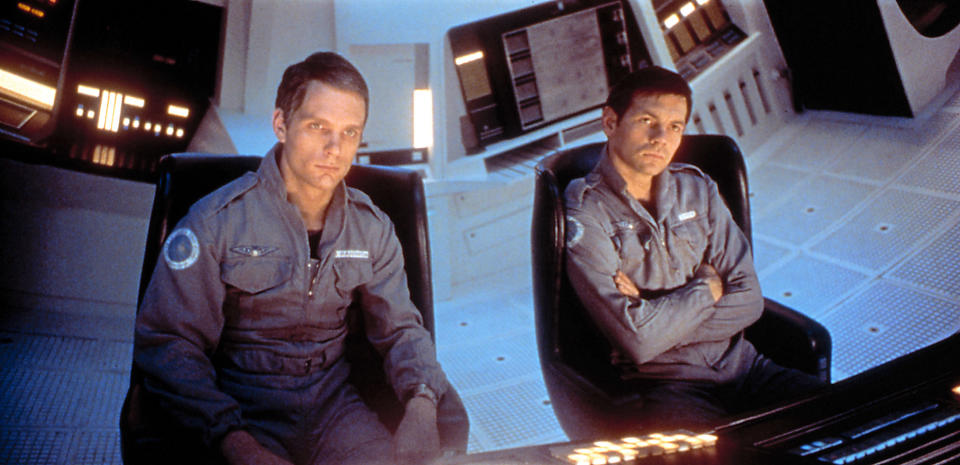
Based on: Actually, the namesake Arthur C. Clarke novel came after.
Why the movie is better: In terms of book vs. movie, here we have a rather interesting case, because the novel version of 2001: A Space Odyssey is based on the film, not the other way around. Director Stanley Kubrick and revered sci-fi author, Arthur C. Clarke, had originally planned to pen the novel together before filming, with various parts of Clarke's original short stories (including his 1951 piece "The Sentinel") and Homer's The Odyssey serving as inspiration. However, the two legends ended up creating their projects simultaneously, and the movie was released just months before the book's publication. While Kubrick was a co-writer of the book, only official Clarke received authorial credit. Clarke did, however, get credit for co-penning the screenplay. While both film and book require multiple viewings — and quite literally span time, space, and dimension — the general plot follows a group of astronauts journeying Jupiter after the discovery of a mysterious alien monolith. During the voyage, their sentient computer system, HAL, turns deadly, culminating in one of the most existentially terrifying showdowns between man and machine you'll ever see on-screen. Both film and book tackle the daunting themes of human evolution, the origins of human consciousness, and the dangers of artificial intelligence, yet Kubrick's film remains the clear juggernaut with its awe-inspiring soundtrack, mind-blowing visuals, and highly inventive non-linear narrative structure.
Where to watch: HBO Max

